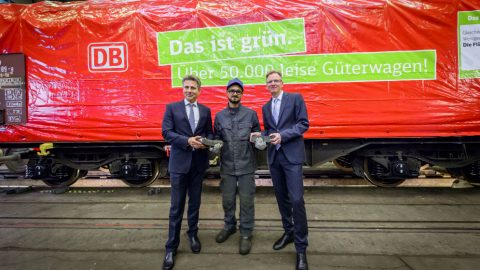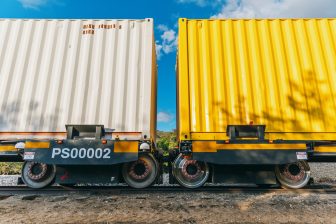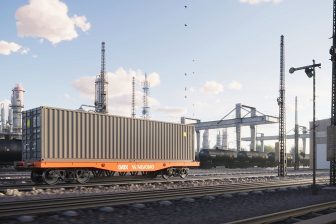
DB Cargo well underway towards silent wagon fleet
Around 80 percent of DB Cargo’s freight cars are now equipped with silent brakes. The German operator aims to reduce railway noise pollution by half by 2020.
Today, DB Cargo has 50,500 silent railcars in in Cologne. These are converted wagons with noise-reducing LL composite brake blocks. “This means that around 80 percent of the DB Cargo wagon fleet in Germany is now equipped with the so-called whisper brakes”, the company commented.
Less friction
Composite brake blocks roughen the wagon wheels much less than the conventional iron cast brakes. As a result, the perceptible noise emissions during a journey are reduced by ten decibels, which is perceived by the human ear as half the noise.
“Relieving residents near railway lines by consistently reducing railway noise is a very important concern for us. We want to shift more traffic to the environmentally friendly rail with our customers. This can only succeed if we simultaneously accomplish quieter trains in rail freight transport”, said Alexander Doll, Chief Financial Officer, Freight Transport and Logistics of Deutsche Bah. “By converting our freight cars to low-noise brakes, we are making a significant contribution.”
Silent fleet by 2020
By 2020, all 63 thousand wagons of DB Cargo will operate silently in Germany. This will cost about 200 million Euros, excluding additional funding. The additional costs are due to the retrofitting itself, but also due to greater effort in the maintenance of freight wagons with composite brake blocks, DB Cargo noted.
Next year, around 7,000 more cars will be equipped with modern brake pads. “We want the railway to be a quiet, good neighbour for everyone. This is especially true for rail freight transport, for which we have introduced a noise-related train path pricing system and are promoting the equipment of wagons with whisper brakes with a fund of more than 150 million Euros.
No noise on German network
In addition, there will be no loud freight wagons on the German rail network next year. With these and other measures, such as noise reduction, we are protecting the people along the routes in a very concrete and audible manner”, said Gerhard Schulz, State Secretary at the Federal Ministry of Transport and Digital Infrastructure (BMVI).
The noise reduction on heavily loaded routes continues to progress. As part of the voluntary noise reduction programme last year, the federal government and the railways invested around 100 million euros in noise protection walls, noise protection windows and other measures.





